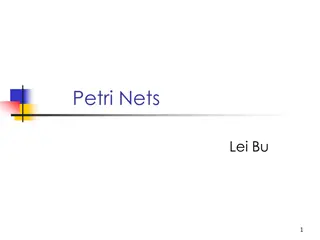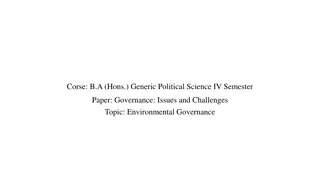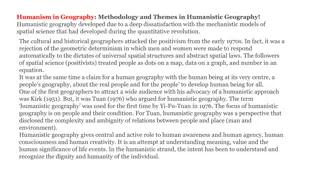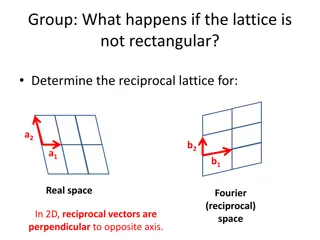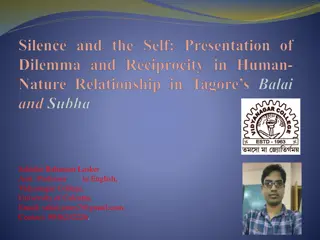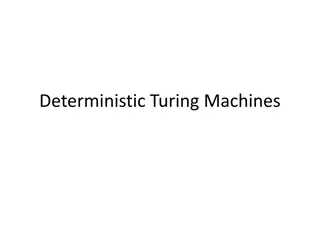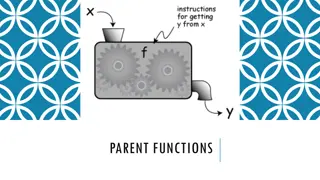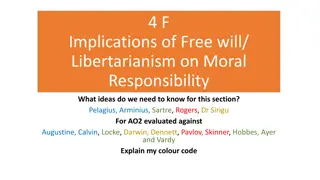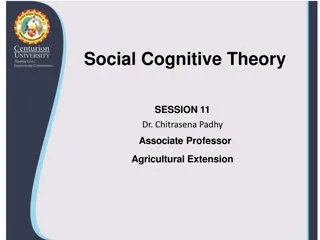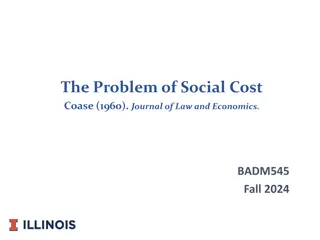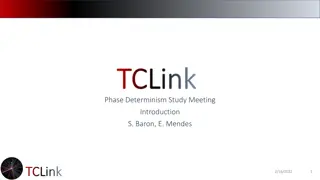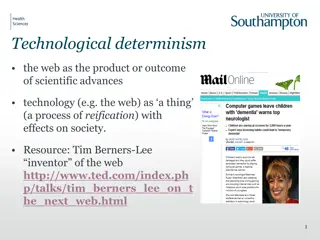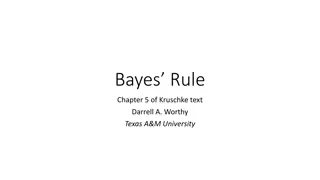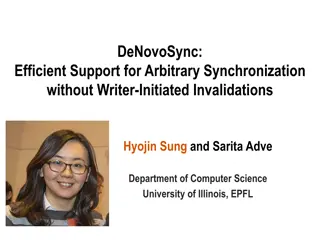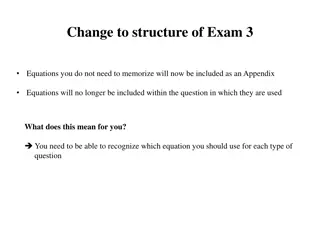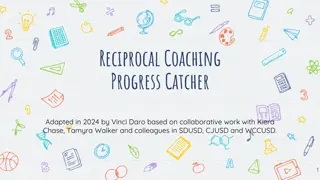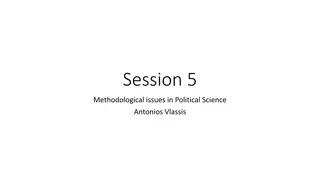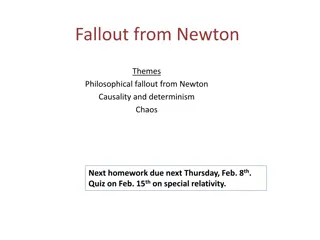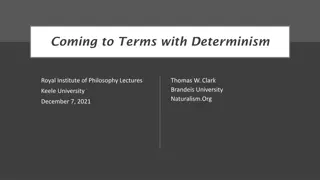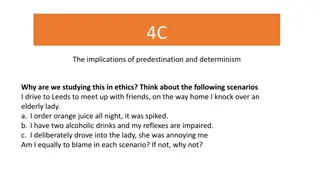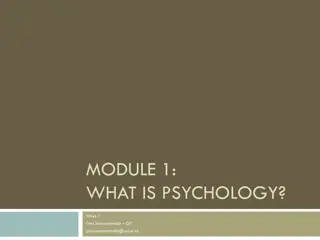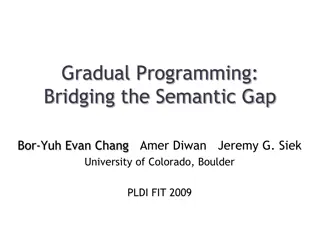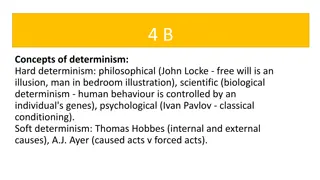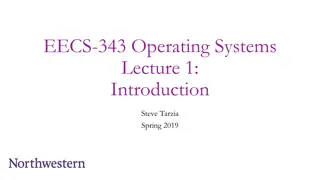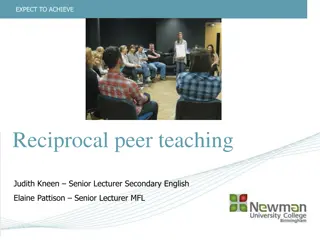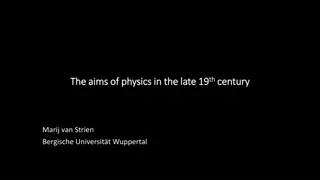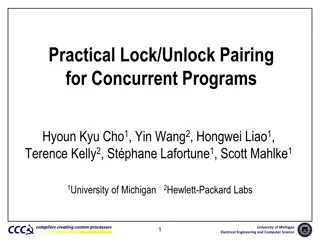Understanding Petri Nets: A Versatile Tool for Modeling Systems
Petri nets are a powerful modeling tool characterized by their asynchronous state transitions, making them ideal for representing concurrent and distributed systems. Originating from Carl Adam Petri's work in the 1960s, Petri nets have found diverse applications in fields such as computer science an
1 views • 84 slides
Mastering Networking for Career Development
Learn about ethical networking, common myths, building networks, and connecting with others. Discover the art of reciprocal relationships to achieve professional goals. Join the Professional Services Careers Club to enhance your networking skills!
4 views • 31 slides
HUMAN GEOGRAPHY
Human geography examines how human groups adapt to their natural environment. It covers various branches such as social, economic, population, historical, political, and military geography. The discipline also explores fundamental principles and theories like environmental determinism, possibilism,
0 views • 6 slides
Understanding Personality Development: Social-Cognitive and Behavioral Perspectives
Social-cognitive theorists view personality development as influenced by the interaction between individual traits and social context, while behavioral theorists focus on learning effects. They relate by emphasizing behavior learning through conditioning and observation, alongside mental processes.
0 views • 19 slides
Understanding Human-Environment Interaction: Environmental Determinism vs. Possibilism
Human-environment interaction is a two-way process shaping cultures and behaviors. Explore the theories of environmental determinism and possibilism, which offer contrasting views on the influence of physical conditions on human societies. Environmental determinism emphasizes the impact of the envir
0 views • 18 slides
Humanism in Geography: Methodology and Themes
Humanistic geography emerged as a critique of mechanistic spatial models during the quantitative revolution, emphasizing human agency, consciousness, and creativity in understanding the complexities of human-place relationships. It rejects geometric determinism and celebrates individual dignity, pro
0 views • 4 slides
Understanding Reciprocal Lattices in Crystal Structures
Explore the concept of reciprocal lattices in crystal structures, including non-rectangular lattices, Fourier space in 2D, Wigner-Seitz cells, Brillouin Zones, and the relationship between BCC and FCC structures. Learn about primitive lattice vectors, construction of the Brillouin Zone, and the sign
0 views • 49 slides
Exploring Nature and Human Relationships in Texts by Tagore
Ecocriticism in Tagore's works delves into the intricate dynamics between human, nature, and non-human elements. Nature is portrayed as a distinct entity, offering solace and companionship to characters like Balai and Subha in their silent yet profound interactions with the environment. Through uniq
0 views • 13 slides
Understanding Deterministic Turing Machines
Detailed explanation of Deterministic Turing Machines, their constituents, formal definition, determinism, and special statuses such as Start, Accept, Reject, and Loop. Includes visual representations and key concepts of deterministic Turing machines.
0 views • 14 slides
Reduction of Feedback Overhead in IEEE 802.11be
Discussion on reducing channel acquisition overhead to support 16 Spatial Stream MIMO and Multi-AP coordination in IEEE 802.11be. Methods include limiting feedback information, using implicit feedback in reciprocal systems, and improving explicit and implicit feedback schemes.
0 views • 14 slides
Understanding Parent Functions and Their Characteristics
This informative content explores different parent functions such as linear, quadratic, cubic, square root, reciprocal, exponential, and logarithmic functions. It delves into their unique properties, graphs, and functions, offering insights into domain, range, and key characteristics of each functio
1 views • 11 slides
NVMe Endurance Group Management: Enhancing SSD Performance
SSD customers have diverse media organization needs, such as capacity pools, performance isolation, or combined pools for varied use cases. NVMeTM Endurance Group Management enables configuring media into Endurance Groups and NVM Sets, catering to different storage requirements efficiently. Learn ab
0 views • 20 slides
Moral Responsibility and Free Will Implications in a Contemporary Context
This text delves into the implications of free will and libertarianism on moral responsibility, examining the ideas of various philosophers and thinkers such as Pelagius, Arminius, Sartre, and more. It explores the concepts of moral agency, determinism, normative ethics, religious beliefs, and the c
5 views • 12 slides
Understanding Social Cognitive Theory: Insights from Albert Bandura
Social Cognitive Theory, developed by Albert Bandura, emphasizes learning through observation and modeling behaviors. The theory explores how individuals acquire new behaviors, thoughts, and attitudes by observing others. Bandura's famous Bobo doll experiment showcased how children imitated aggressi
6 views • 17 slides
The Problem of Social Cost: Coase's Analysis and Revisions
Coase (1960) revisited Pigou's (1920) approach on harmful actions and externalities, emphasizing the reciprocal nature of the problem. He proposed considering social net products alongside private products, emphasizing the importance of rights and efficient resource allocation. This critical analysi
0 views • 12 slides
Understanding Phase Determinism Study Meeting Presentation
This presentation covers various aspects of phase stability, reproducibility, and determinism in TCLink architecture. It includes open questions regarding temperature variations, performance relationships, clock synchronization, stability enhancements, and architectural considerations. Detailed outl
0 views • 9 slides
Exploring the Relationship Between Technology and Society through Historical Perspectives
This collection delves into the complex interplay between technology and society, contrasting the deterministic view with the idea of reciprocal shaping. It examines various epochs from pre-modernity to the information age, highlighting how technology has influenced cultural shifts and modernity its
6 views • 28 slides
Understanding Bayes Rule and Its Historical Significance
Bayes Rule, a fundamental theorem in statistics, helps in updating probabilities based on new information. This rule involves reallocating credibility between possible states given prior knowledge and new data. The theorem was posthumously published by Thomas Bayes and has had a profound impact on s
0 views • 34 slides
Efficient Support for Synchronization Without Invalidations
Addressing complex software issues like data races and inefficiencies in hardware synchronization, the DeNovoSync solution provides efficient support for arbitrary synchronization without writer-initiated invalidations. By introducing disciplined shared memory with structured synchronization and exp
0 views • 40 slides
Exploring European Theatre Traditions
European theatre traditions, as discussed through Lehmann's Postdramatic Theatre and Aristotle's dramatic elements, highlight the unique characteristics that differentiate them from non-European traditions. Concepts such as hamartia, anagnorisis, and mimesis are explored along with the rejection of
0 views • 30 slides
Understanding Coevolution: An Example from Wild Parsnip and Webworms
Coevolution, a reciprocal evolutionary change in interacting species, can be observed in the relationship between wild parsnip plants containing toxic compounds and webworms that can metabolize these toxins. This example demonstrates the prerequisites for coevolution, including genetic variation and
0 views • 35 slides
Reciprocal Coaching Framework for Professional Development
The Reciprocal Coaching Framework, adapted in 2024 by Vinci Daro in collaboration with educators from several school districts, emphasizes setting goals, identifying teaching actions, and collecting artifacts to facilitate a structured coaching process. Partnerships are established, individual goals
0 views • 27 slides
Enhancing Replay Interface Efficiency in System Debugging
Efforts by researchers at Microsoft Research Asia and MIT focus on enhancing replay interface efficiency for system debugging. The motivation stems from the non-determinism challenges caused by time, user input, network I/O, and thread interleaving. The study observes that only certain parts of a pr
0 views • 26 slides
Understanding P vs. NP: A Comprehensive Overview
Delve into the complexities of computational problem-solving with insights on P, NP, NP-complete, determinism, and non-determinism. Explore the distinctions between deterministic and non-deterministic algorithms and the implications they have on problem-solving capabilities. Gain a deeper understand
0 views • 22 slides
Understanding Classical Marxism: Key Concepts and Critiques
Marxism, rooted in the ideas of Karl Marx, emphasizes the significance of economic relations in shaping social and political structures. Classical Marxism focuses on economism, determinism, materialism, and structuralism, viewing history through a lens of class struggle and offering an emancipatory
0 views • 21 slides
Efficient Hardware Support for Disciplined Non-Determinism in Shared Memory Systems
DeNovoND presents a holistic approach to rethinking memory hierarchy, aiming to enhance hardware efficiency for disciplined non-determinism in shared memory systems. The work addresses limitations in deterministic programming, offering strong safety properties and simplified coherence and consistenc
0 views • 28 slides
Interstate Reciprocal Overpayment Recovery Arrangement (IRORA) and Its Implementation
Explore the Interstate Reciprocal Overpayment Recovery Arrangement (IRORA), an agreement among participating states for the recovery of benefit overpayments through offsetting. Learn about the membership details, duties of requesting and recovering states, and the history of out-of-state overpayment
0 views • 17 slides
Newtonian Determinism and Philosophy: A Critical Examination
Within Newton's philosophical framework, the interplay between causality, determinism, and empiricism shapes his views on space, time, and the nature of reality. Examining his rules of reasoning and the implications of Newtonian determinism, we delve into the philosophical underpinnings of his scien
0 views • 16 slides
Exploring Determinism: Insights on Free Will and Causality
Delve into the philosophical discourse on determinism with a critical examination of free will, agency, and the implications of causality. Discover how leading thinkers challenge the conventional notions of choice and explore the complexities of human behavior in light of scientific revelations.
0 views • 26 slides
Exploring Determinism and Predestination in Ethics
Delve into the implications of predestination and determinism in ethical discussions, pondering scenarios like moral responsibility in various situations. Match thinkers with their theories on determinism, and discover key vocabulary related to the impact of determinism on moral responsibility and p
0 views • 10 slides
Exploring Concepts of Free Will and Predestination in Philosophy and Religion
Delve into the intricate debate surrounding free will and predestination from philosophical, scientific, and religious perspectives, examining arguments from determinism to libertarianism. Evaluate the compatibility of predestination and free will, religious views on free choice, and the implication
0 views • 15 slides
Understanding Psychology: From Early Philosophy to Modern Practices
Psychology, originating in the study of the soul and mind, has evolved into a science focusing on behavior and experience. Key philosophical issues such as free will vs. determinism and nature vs. nurture continue to shape the field. Psychologists serve individuals and organizations in diverse roles
0 views • 19 slides
Bridging the Semantic Gap in Gradual Programming
Observing a disconnect between programmer intent and program meaning, Gradual Programming by Bor-Yuh Evan Chang, Amer Diwan, and Jeremy G. Siek explores tools' lack of knowledge in understanding programmers' priorities, hindering productivity and reliability. Through examples like iteration orders a
0 views • 8 slides
Understanding Determinism: Hard and Soft Concepts Explored
Determinism posits that all events are determined by preceding causes, impacting human behavior as well. Hard determinism denies free will, attributing actions solely to external factors, while soft determinism allows for free will alongside external influences. Philosophical, scientific, and psycho
0 views • 9 slides
Introduction to Operating Systems: EECS 343 Lecture Overview
In this introductory lecture of EECS 343 Operating Systems, Professor Steve Tarzia discusses the course structure, importance of studying OS, key topics like security and performance, course logistics, prerequisites, and collaboration policy. Students will gain valuable experience with C, Linux, and
0 views • 27 slides
Exploring the Interplay of Freedom and Determinism: Hobbes's Regress Argument
Delve into the philosophical debate between freedom and determinism through the lens of Hobbes's Regress Argument, examining the challenges posed by the relationship between freedom of action and freedom of will in the context of human decision-making.
0 views • 21 slides
Early Positivism and the Positive School of Criminology
The early positivist school of criminology, including figures like Lombroso and Gall, focused on applying scientific methods to understand criminal behavior. Phrenology, atavism, and criminal anthropology were key concepts explored, emphasizing determinism and individual offender characteristics. Th
0 views • 18 slides
Enhancing Learning Through Reciprocal Peer Teaching in Higher Education
This presentation discusses the concept of reciprocal peer teaching in higher education, focusing on how students can take on teaching roles to enhance their learning experience. The speakers emphasize the benefits and strategies of peer teaching, providing a framework for implementing this approach
1 views • 20 slides
Evolution of Physics Goals in the Late 19th Century
Physicists in the late 19th century shifted towards modesty regarding the aims of physics, moving away from ontology and truth claims. The ideal of reduction to matter and motion was criticized, and determinism was seen as a regulative principle rather than a proven feature. The concept of descripti
0 views • 35 slides
Practical Lock/Unlock Pairing for Concurrent Programs
The research discusses the challenges of concurrency in parallel programming and the importance of proper lock/unlock pairing to avoid bugs and non-determinism. Tools for bug detection and automated bug fixing are explored, along with examples illustrating the process. The issue of unpaired locks an
0 views • 20 slides
